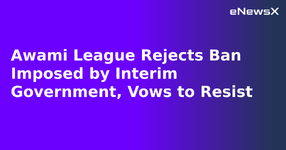Political Turmoil Deepens as Hasina-Led Party Denounces Action as ‘Fascist’, Calls for Global Condemnation
Dhaka/New Delhi, May 11 — The Awami League, Bangladesh's oldest and historically significant political party, has strongly rejected the interim government's decision to ban its operations. In a defiant statement issued on Sunday, the Sheikh Hasina-led party condemned the move as “fascist” and vowed to continue its activities despite the restriction.
On Saturday night, the Muhammad Yunus-led interim government officially imposed a ban on all activities of the Awami League — both offline and online — citing provisions of the country’s anti-terrorism law. The decision, delivered through the Council of Advisers, has triggered a wave of political backlash.
In a sharply worded statement posted on X, the Awami League stated, “We are rejecting and protesting the fascist autocrat Yunus government’s decision with disgust. Awami League will carry on its activities in an appropriate course, defying the decision of the fascist Yunus government.”
The party decried the ban as a betrayal of Bangladesh’s democratic roots, highlighting that the very sovereignty of the nation was achieved under the Awami League’s leadership during the 1971 Liberation War. “This ban aims to exile the spirit, ideals, and core values of the Liberation War,” the statement added.
Allegations of Anti-State Conspiracy
Labeling the interim administration as an “anti-state and anti-independence evil force,” the party appealed to the people of Bangladesh to resist the ban and stand united in opposition. “We call upon all leaders and activists of Awami League to stand shoulder to shoulder with the people and build a total resistance,” the statement declared.The Awami League also urged democratic nations and international institutions to condemn the government's decision, warning of the dangerous precedent it sets.
Government Defends Action
In response, the press secretary to Chief Adviser Muhammad Yunus, Shafiqul Alam, defended the ban by drawing parallels with historical precedents in the West. “There are examples of banning political parties that were anti-democracy and criminal in nature, like the Nazi and Fascist parties,” Alam said, expressing confidence that the international community would not oppose the move.Legal and Electoral Implications
The Election Commission (EC) of Bangladesh is currently awaiting formal government notification to determine whether the Awami League’s registration will be revoked. If the registration is cancelled, the party will be barred from contesting the upcoming general elections, slated between December 2025 and June 2026.“We will have to decide going with the spirit of the present Bangladesh,” Chief Election Commissioner AMM Nasir Uddin told reporters.
Context of Political Upheaval
Sheikh Hasina’s 16-year-long tenure ended on August 5 last year following a student-led mass uprising. The violent movement forced the 77-year-old former prime minister to flee to India. In the power vacuum that followed, Nobel laureate Muhammad Yunus assumed charge as the chief adviser of the interim government.Since then, numerous cases including mass murder and corruption have been filed against Hasina and key Awami League leaders. Most of them are either under arrest or in exile.
The ban followed days of protest blockades in Dhaka by activists of the recently formed National Citizen Party (NCP), who demanded the dissolution of the Awami League, labeling it “killer” and “corrupt.”
As political fault lines deepen, Bangladesh faces an increasingly volatile landscape with no immediate resolution in sight.
